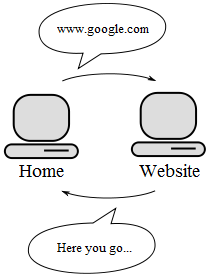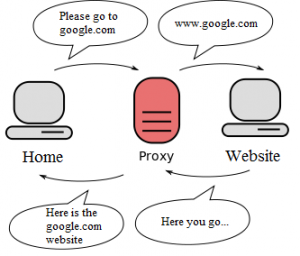 Understanding terms like proxy, anonymous proxy or elite proxy can be very difficult if you aren’t familiar with the slight differences between the two and why anyone would even want to use a proxy in the first place.
Understanding terms like proxy, anonymous proxy or elite proxy can be very difficult if you aren’t familiar with the slight differences between the two and why anyone would even want to use a proxy in the first place.
Proxy servers, or proxies as people often call them, are used both publically by large businesses and privately people from their own home.
There’s a very good chance that the Internet company you use to go online with also has its own proxy, but the problem here is that it is very different from an elite or anonymous proxy most people use from their house while surfing the Internet.
The first step to navigating the differences between proxies available today and making sure you pick the right proxy server for you is to understand the basics of how they work and what they do, trust me, it won’t hurt one bit.
A very basic definition of the word proxy is that someone represents someone else and acts on their behalf. Now, we’re talking about computers here, so a proxy when used in relation to computers, a proxy is a server or computer that does something for another computer.
Confused?
I hope not. The best way to understand how a proxy works is to ask yourself about what you do online. When you visit your favorite website, what do you do? You type in the domain name and start surfing the website directly from your home computer.
It’s a simple A to B connection, where A is your home computer and B is the website you want to visit. The picture below gives you a visual idea of what this connection looks like. Your home computer connects directly to a website like Google.com, and then the website sends back the information you requested, such as text or images.
 Now, when a proxy is used another step is added to the journey. Instead of connecting directly to the website you want to visit, you first connect to the proxy server and then finally connect to the website you want to browse.
Now, when a proxy is used another step is added to the journey. Instead of connecting directly to the website you want to visit, you first connect to the proxy server and then finally connect to the website you want to browse.
In this kind of setup, there are now three steps: A to B to C. B here represents the proxy and you can see that it acts as a go between for when you surf the Internet. The picture below should help you to visualize how this works.
Instead of you directly surfing to the website you want to visit, the proxy server does it for you on your behalf, hence the name “proxy server”. You first tell the proxy where you want to go and it follows your command. The website then passes the information to your proxy server that then passes the information back to you.
 If you use a proxy server to surf the Internet, then this A to B to C configuration occurs for anything and everything you do online.
If you use a proxy server to surf the Internet, then this A to B to C configuration occurs for anything and everything you do online.
That’s why they are called proxies, because the proxy server acts as a go between and anything you do online is now handled by the proxy server and not directly by your home computer.
Proxies are somewhat similar to remote computers, where you use your home computer to connect to another computer and then take control of it to surf the web.
OK, so hopefully you now have a basic idea of what a proxy is, so the next step is to understand why people use proxies while online.
I am over simplifying things here, but there are two very broad reasons why people use proxies.
You may be asking how this can even be possible, because if you use a proxy server then your Internet surfing is three steps instead of two, so how can surfing websites be faster?
Adding an additional step to any task should mean the same task now takes longer to complete, and in most cases that is true, but not for proxies. This kind of proxy server is used by ISPs or Internet companies, like the one you are using now to connect to this website.
They use proxies to cache data. They do this because they have so many customers and there is a very good chance that there are a few websites online that a large portion of their customers frequent again and again, such as Facebook. So, to save on data costs and improve speed, ISPs use a proxy server to cache or store temporary copies of these frequently visited websites on their own servers.
This saves them money because their customers download the data directly from the ISP. More importantly, it saves you time because downloading from your ISP is much faster than downloading from a website that could potentially be on the other side of the planet. While transmitting data over the Internet is obviously very fast, the greater the distance between two computers, the longer it takes for the information to be received.
These kinds of proxies are used for caching or temporarily storing data to improve the speed of a network, but it’s NOT the kind of proxy you probably want to use or may have seen people talking about online.
Those proxies allow people to be anonymous online. The vast majority of people who look for proxies are looking for ones that allow them to be anonymous online.
Aren’t you anonymous online already?
Since no-one can really “see” who you are and it is very easy to create accounts on websites using fake information, why bother using a proxy server to be anonymous when you are already anonymous?
While it is true people can’t see you online and you often don’t need to provide any personal information whilst visiting websites or you can easily use fake information to register at websites, you aren’t actually anonymous. Anonymity online has nothing to do with you as a person, such as being able to see your face or hear your voice, it has to do with your home computer, such as your IP.
Every server or computer that is connected to the Internet has an IP. An IP is basically a digital address, much like your home postal address that people send letters to, and it allows your computer to communicate and talk with all the other millions of machines around the world that are also connected to the Internet.
Without an IP no-one would be able to find you online. When you connect to a website, you leave a digital footprint. That digital footprint is your IP.
If I know your IP, then I have access to information which allows me to see which country, state and city you are most likely from. I can also see which ISP you are using to connect to the Internet and this means it would, at least in theory, be possible for me to find out more information about you.
While the kind of information an IP provides isn’t exactly personal, it’s not as if I know your name and the exact address of your house or your name, an IP provides enough information for me to potentially find out more about you if I really wanted to because I know which ISP you are using and I could contact them to find out more about you.
I hope the above has helped demystify the world of proxies for you. While there are many different types of proxies around, they essentially either cache data to speed up your web surfing or they are used to be anonymous online.
So which one is right for you?
If you aren’t trying to be anonymous or hide your identity online, then you may want to give the proxy server offered by your ISP a go.
You may find that using it does speed up your Internet experience. However, if you are looking to be anonymous, then the bad news is that things start to get a little more confusing.
Being anonymous online with a proxy server is easy, but what isn’t easy is navigating your way through and understanding the exact difference between the kinds of proxy servers that make Internet anonymity possible. The good news is that I wrote an article about elite proxies versus anonymous proxies not too long ago, so check it out if you are interested.
Want a real technical and boring description of the above? Wikipedia has an article that provides more in-depth information about proxies HERE, but a word of warning. It can be a little dull and boring, which is why I wrote the above.
Tags: anonymous, IP, Proxy Server